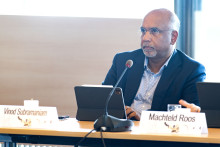The government wants a 3G rule for higher education. This means that students must be vaccinated, recovered or tested in order to follow on campus education. The University Council is not allowed to have a say in the implementation of the Covid Pass at their institution, says a bill submitted to the Parliament. Early November, the UT announced that it was not in favour of the Covid Pass.
Student wellbeing
Danique Damen of student party DAS is disappointed that the University Council is not involved in the introduction. According to her, the introduction of the Covid Pass at universities is very difficult. ‘We will have to adjust lecture times to avoid long queues. It is difficult to implement and the consequence will be that many lectures will be held online again.’ And that is anything but favourable to student wellbeing, says Damen.
Sjoerd van den Belt of student party UReka agrees. He refers to the recent RIVM research, which shows that many students struggle with mental problems and stress. ‘That’s why it’s important that physical education continues for as long as possible.’ A 3G Covid pass can help keep physical education available, but Van den Belt questions the practical feasibility. ‘It has to be implementable. A Covid pass requires a lot of manpower and the workload of teachers is already high.’
According to Van den Belt, there are also ethical considerations. There must be alternatives for students who – voluntarily or not – are unable to show a Covid Pass, he states. ‘Some international students still have issues with their QR code. If the Covid Pass is introduced, there must be sufficient testing capacity. It is also important that online alternatives remain available.’
Local solutions
According to Herbert Wormeester, chairman of the University Council, the Covid Pass is a ‘big dilemma’ for universities. ‘Teachers want to give proper education to students, but at the same time they need to do that in a safe environment.’ Online or hybrid education are ‘suboptimal’, says the chairman. ‘Certainly at a technical university, where students need to make use of labs, for example. You can’t do that at home in the kitchen.’
That is why Wormeester hopes that education will remain physical as much as possible. A QR code can help with that. But he too has his doubts about the practical feasibility. ‘It requires an extra effort and there is no room for that among teachers. We can’t just quickly introduce it, extra resources are needed.’
Wormeester also points out the importance of ‘local choices’. ‘That is precisely what we as the University Council can help discuss. You shouldn’t put security guards at the entrances here. I saw it at my own swimming club. When the Covid pass was introduced, I stood at the door myself. That worked fine. Other clubs put security guards in front of the entrance. There, things got completely out of hand. That’s why the local interpretation is so important.’
It is not that hard
University Council member Dick Meijer (PvdUT) also thinks it is important that the University Council participates in the implementation. According to him, this did not happen with previous Covid measures. ‘In the summer of 2020, the UT kept the university closed longer than strictly necessary to the government. All exams still had to be taken online, too. I was against that, but it was never discussed in the University Council.’
If the Covid Pass is nationally introduced, Meijer knows that the UT will have to accept it. ‘We will have it imposed on us by the government. If it prevents infections, I think it is acceptable. It's no fun, but we can do it at the UT just fine. There are enough student assistants to check QR codes. You just have to organise it – it’s not that hard.’







